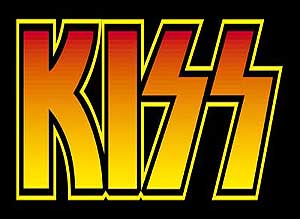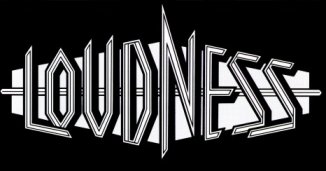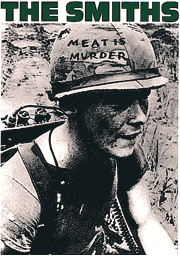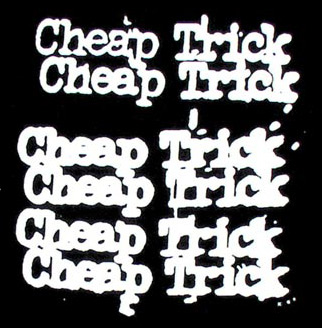 “The Big Seven” is my corny phrase for a group of musical acts that I collect, listen to, and talk about incessantly. Most who know me well can recite the members of the elite Big Seven; those merely familiar with me have probably at least heard the phrase. Each particular band made its entry into the Big Seven at various times between 1985 and 1990. The theory of the “Big Seven” was only a state of mind prior to the last band’s entry at which time the phrase “Big Seven” came into being. Since the title has now become nothing short of Brad-cultural-lore, there can and will never be a “Big Eight,” although an eighth band was added at one point. Fortunately, this eighth band had a mutual member with Band #7, so it operates under the umbrella of the seventh band.
“The Big Seven” is my corny phrase for a group of musical acts that I collect, listen to, and talk about incessantly. Most who know me well can recite the members of the elite Big Seven; those merely familiar with me have probably at least heard the phrase. Each particular band made its entry into the Big Seven at various times between 1985 and 1990. The theory of the “Big Seven” was only a state of mind prior to the last band’s entry at which time the phrase “Big Seven” came into being. Since the title has now become nothing short of Brad-cultural-lore, there can and will never be a “Big Eight,” although an eighth band was added at one point. Fortunately, this eighth band had a mutual member with Band #7, so it operates under the umbrella of the seventh band.
The order of the Big Seven is imperative and unchanging, although the order does not necessarily imply an order of importance, quality, or success. Nor does it imply the order in which I began to like the band, but instead indicates the order to which they became inducted into the Big Seven, or the equivalent state of mind that preceded the title.
This posting is simply an introduction to the Big Seven, along with the reason why they became BS-certified, and my justification for them being included in the elite grouping. The definition of Big Seven (according to my cat Tiny) is any band by which Brad has made it his life’s ambition to successfully secure all music from the band or the members therein, in addition to striving to collect memorabilia, t-shirts, autographs, or see the band or its members live in concert or in a casual meeting setting.
It is unbelievable how much music and offspring acts that seven bands can produce. The Big Seven music collection will probably never be complete – and there certainly will be no effort to complete a memorabilia collection of even one of the Big Seven.
At long last, the Big Seven:
 KISS was the first rock band I became obsessed with and this happened way back in 1978 when the band was still in its heyday. I went from attempting to collect all of the Sesame Street records to collecting all KISS records. I followed this band in the late seventies, losing interest in the early eighties, then renewed my fascination with the ‘classic KISS’ shortly after they had removed their makeup. This was the first band that I intended to collect every CD of both the band and individual members. KISS initially grabbed my interest due to their wild makeup and circus-style stage show, but I also enjoyed the music itself and continue to do so to this day. And so does the public, as the band continues to put on concerts – again in makeup. Those that think that KISS’ gimmick alone kept them afloat for over 30 years can guess again.
KISS was the first rock band I became obsessed with and this happened way back in 1978 when the band was still in its heyday. I went from attempting to collect all of the Sesame Street records to collecting all KISS records. I followed this band in the late seventies, losing interest in the early eighties, then renewed my fascination with the ‘classic KISS’ shortly after they had removed their makeup. This was the first band that I intended to collect every CD of both the band and individual members. KISS initially grabbed my interest due to their wild makeup and circus-style stage show, but I also enjoyed the music itself and continue to do so to this day. And so does the public, as the band continues to put on concerts – again in makeup. Those that think that KISS’ gimmick alone kept them afloat for over 30 years can guess again.
 By far the most obscure band in the Big Seven is Loudness. I became fascinated with this Japanese heavy metal band in 1986. On a whim, I purchased their first American cassette and greatly enjoyed it. Right at this time, they were releasing their third US album and touring in my area. I was able to meet them and see them in concert this one and only time. After this, I sought to locate their rare Japanese records, and once I began finding them, I liked these even better. After getting a CD player, I made it my intent to find all of their work on CD. Since then, the group has been whittled down to one founding member and then reunited in their original form. They have also created more than a dozen splinter bands, including one pop band Lazy that included two original members and actually preceded Loudness, but continue to perform. Because of the incredible talent of all of these bands, I have found an immense appreciation of Japanese music in general. Loudness continues to perform today.
By far the most obscure band in the Big Seven is Loudness. I became fascinated with this Japanese heavy metal band in 1986. On a whim, I purchased their first American cassette and greatly enjoyed it. Right at this time, they were releasing their third US album and touring in my area. I was able to meet them and see them in concert this one and only time. After this, I sought to locate their rare Japanese records, and once I began finding them, I liked these even better. After getting a CD player, I made it my intent to find all of their work on CD. Since then, the group has been whittled down to one founding member and then reunited in their original form. They have also created more than a dozen splinter bands, including one pop band Lazy that included two original members and actually preceded Loudness, but continue to perform. Because of the incredible talent of all of these bands, I have found an immense appreciation of Japanese music in general. Loudness continues to perform today.
 I loved Styx back in the seventies and never lost my appreciation for them, but I did not really begin to ‘collect’ their complete works until 1988 after I got my first CD player. My aunt Darlene had several Styx albums and they would get a lot of play whenever I visited her at my Grandparents’ house. Later on, these great albums from my childhood became a must-have in CD format. Even amidst my ‘heavy metal’ days, when I wouldn’t collect anything but, Styx -as pop as they were- somehow slipped into my CD collection. Styx has parted ways, re-formed, re-configured, and continues to perform today. In fact, I just saw their lead singer Dennis DeYoung in Las Vegas last year.
I loved Styx back in the seventies and never lost my appreciation for them, but I did not really begin to ‘collect’ their complete works until 1988 after I got my first CD player. My aunt Darlene had several Styx albums and they would get a lot of play whenever I visited her at my Grandparents’ house. Later on, these great albums from my childhood became a must-have in CD format. Even amidst my ‘heavy metal’ days, when I wouldn’t collect anything but, Styx -as pop as they were- somehow slipped into my CD collection. Styx has parted ways, re-formed, re-configured, and continues to perform today. In fact, I just saw their lead singer Dennis DeYoung in Las Vegas last year.
 The Smiths were introduced to me in 1988 by my friend Lance. Initially, I hated them and everything that they stood for. During this time period, I liked heavy metal music – and nothing else. The Smiths were new-wave alternative and by definition, that meant I couldn’t stand them. But for some reason, I decided to borrow one of their tapes, take it home, and listen to it… maybe just to ridicule it. Somehow, I became absolutely hooked on it – and wanted more. Right around this time, the band broke up, but their lead singer Morrissey went out on his own and continues to produce incredible albums to this day. I’ve only been fortunate enough to see Morrissey in concert once, but my admiration for his music – including that on his newest album from earlier this year – hasn’t dwindled one iota.
The Smiths were introduced to me in 1988 by my friend Lance. Initially, I hated them and everything that they stood for. During this time period, I liked heavy metal music – and nothing else. The Smiths were new-wave alternative and by definition, that meant I couldn’t stand them. But for some reason, I decided to borrow one of their tapes, take it home, and listen to it… maybe just to ridicule it. Somehow, I became absolutely hooked on it – and wanted more. Right around this time, the band broke up, but their lead singer Morrissey went out on his own and continues to produce incredible albums to this day. I’ve only been fortunate enough to see Morrissey in concert once, but my admiration for his music – including that on his newest album from earlier this year – hasn’t dwindled one iota.
 It’s hard to believe that The Beatles are in the number five spot of the Big Seven – especially since I listened to them back before I could eat solid foods. My Dad was a fan of the Beatles – heck, who wasn’t? – and had some of their albums. For some reason, though, as a kid I only like a few of their songs and wasn’t interested in them for the most part. When John Lennon was killed, however, I became enamored of them due to the deluge of radio play they received at the time. It wasn’t until 1989 that I decided that I would collect not only all of their work, but the solo work of the members as well. I don’t even need to explain how successful and beloved the Beatles are but I will say that I think much of their solo work in under-appreciated. The two surviving Beatles continue to produce quality music today and I have seen both in concert.
It’s hard to believe that The Beatles are in the number five spot of the Big Seven – especially since I listened to them back before I could eat solid foods. My Dad was a fan of the Beatles – heck, who wasn’t? – and had some of their albums. For some reason, though, as a kid I only like a few of their songs and wasn’t interested in them for the most part. When John Lennon was killed, however, I became enamored of them due to the deluge of radio play they received at the time. It wasn’t until 1989 that I decided that I would collect not only all of their work, but the solo work of the members as well. I don’t even need to explain how successful and beloved the Beatles are but I will say that I think much of their solo work in under-appreciated. The two surviving Beatles continue to produce quality music today and I have seen both in concert.
 Cheap Trick is probably the least prodigious band in the Big Seven. Mostly, this is because they have remained a unified force for nearly their entire career with the same four members currently that they started with originally. I had picked up a couple of their CD’s on a whim but didn’t pay a lot of attention to them, but I was suddenly struck with how good they were and decided to keep buying their CDs in 1989. Finally, I realized that this was a band of whom I simply must complete their catalog. Cheap Trick is the only act that I saw in concert before I considered them a Big Seven band. The more I heard from them, the more I loved them – and still do. They are still making music.
Cheap Trick is probably the least prodigious band in the Big Seven. Mostly, this is because they have remained a unified force for nearly their entire career with the same four members currently that they started with originally. I had picked up a couple of their CD’s on a whim but didn’t pay a lot of attention to them, but I was suddenly struck with how good they were and decided to keep buying their CDs in 1989. Finally, I realized that this was a band of whom I simply must complete their catalog. Cheap Trick is the only act that I saw in concert before I considered them a Big Seven band. The more I heard from them, the more I loved them – and still do. They are still making music.
I began to consider the previous six bands as ‘my bands’ at this point. I would draw their logos on my high-school notes and folders, talk about them, play them constantly, and make tapes of their music for other people. I didn’t plan on adding any additional bands – until these two came along.
 Last and certainly not least, is Depeche Mode, another band introduced to me by Lance in 1988. I liked them fairly well but did not consider them to be Big Seven caliber, until I began to add their CD’s one by one to my collection. This was the last band to be inducted into the Big Seven and it happened during my college years in 1990 – as my musical taste began to shift more to the alternative world. Depeche Mode still continues to produce albums – as does the offspring band Erasure. I love Erasure enough that this band could stand on their own as a Big Seven entity. But as luck would have it, one member of Erasure was a former
Last and certainly not least, is Depeche Mode, another band introduced to me by Lance in 1988. I liked them fairly well but did not consider them to be Big Seven caliber, until I began to add their CD’s one by one to my collection. This was the last band to be inducted into the Big Seven and it happened during my college years in 1990 – as my musical taste began to shift more to the alternative world. Depeche Mode still continues to produce albums – as does the offspring band Erasure. I love Erasure enough that this band could stand on their own as a Big Seven entity. But as luck would have it, one member of Erasure was a former member of Depeche Mode, playing on their first album only… so the two bands are inextricably linked forevermore.
member of Depeche Mode, playing on their first album only… so the two bands are inextricably linked forevermore.
I think the amazing unifying trait that all seven of these bands share is their incredible staying power. From professors of power pop, to heavy metal, to theatrical hard-rock, to alternative-rock, to pop-rock, to synth-rock, to dance, the incredible fact about all these bands is that they all continue to perform and produce new music in some incarnation. This is a fact that I couldn’t have possibly known almost twenty years ago when I chose them to be the Big Seven, at a time when some of the bands were already near the end or past the average life-cycle of a music group.
I guess I would just say, regardless of your personal opinion of these bands, you can’t deny the fact that I know how to pick ’em.
Leave a Reply